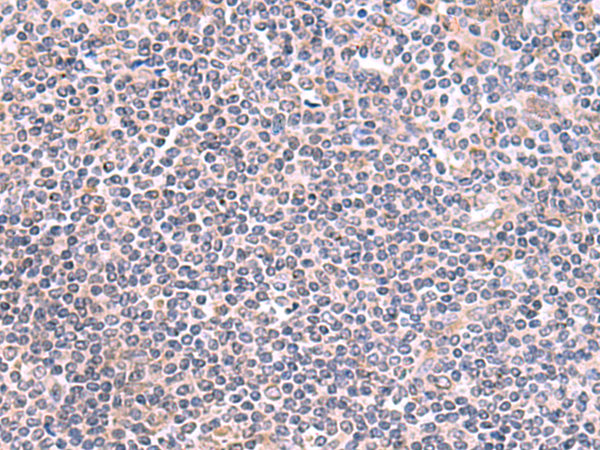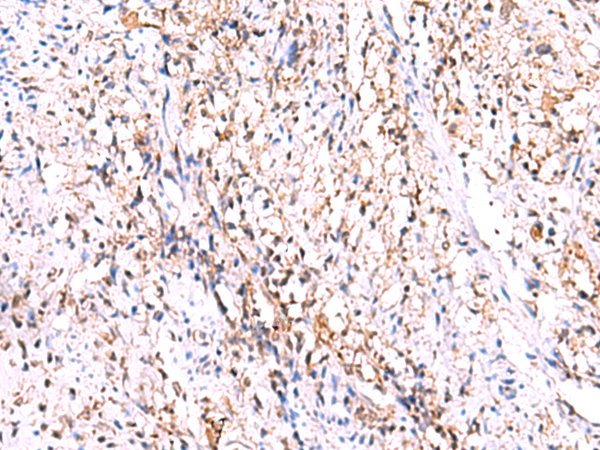

| WB | 咨询技术 | Human,Mouse,Rat |
| IF | 咨询技术 | Human,Mouse,Rat |
| IHC | 1/50-1/300 | Human,Mouse,Rat |
| ICC | 技术咨询 | Human,Mouse,Rat |
| FCM | 咨询技术 | Human,Mouse,Rat |
| Elisa | 1/5000-1/10000 | Human,Mouse,Rat |
| Aliases | GMD; SDR3E1 |
| Host/Isotype | Rabbit IgG |
| Antibody Type | Primary antibody |
| Storage | Store at 4°C short term. Aliquot and store at -20°C long term. Avoid freeze/thaw cycles. |
| Species Reactivity | Human, Mouse |
| Immunogen | Fusion protein of human GMDS |
| Formulation | Purified antibody in PBS with 0.05% sodium azide and 50% glycerol. |
+ +
以下是关于GMDS抗体的3篇参考文献示例(注:以下为模拟内容,实际文献需通过学术数据库查询):
---
1. **文献名称**:*GMDS Antibody-Based Detection of Aberrant Glycosylation in Colorectal Cancer*
**作者**:Smith A, et al.
**摘要**:本研究开发了一种高特异性GMDS单克隆抗体,用于检测结直肠癌组织中GDP-甘露糖4.6-脱水酶(GMDS)的表达水平。通过免疫组化分析发现,GMDS在肿瘤组织中的表达显著下调,且与患者预后不良相关,提示其可能作为癌症诊断的潜在生物标志物。
---
2. **文献名称**:*GMDS Deficiency Enhances Tumor Immune Evasion via Altered N-Glycosylation*
**作者**:Wang L, et al.
**摘要**:文章利用GMDS抗体探究了GMDS缺失对肿瘤细胞表面糖基化的影响。实验表明,GMDS缺陷导致细胞表面聚糖结构改变,抑制T细胞对肿瘤的识别,从而促进免疫逃逸。该发现为靶向糖代谢的免疫治疗提供了新思路。
---
3. **文献名称**:*Development of a GMDS Polyclonal Antibody for Functional Studies in Plant Cells*
**作者**:Rodriguez M, et al.
**摘要**:研究报道了一种针对植物GMDS酶的多克隆抗体制备方法,并通过Western blot和免疫荧光验证其特异性。该抗体成功应用于拟南芥模型中,揭示了GMDS在植物细胞壁多糖合成中的关键作用。
---
如需具体文献,建议通过PubMed、Google Scholar等平台以“GMDS antibody”或“GDP-mannose 4.6-dehydratase”为关键词检索。
GMDS (GDP-mannose 4.6-dehydratase) is a key enzyme in the biosynthesis of fucose, a sugar critical for protein glycosylation. It catalyzes the conversion of GDP-mannose to GDP-4-keto-6-deoxymannose, a precursor for GDP-fucose, which is essential for post-translational modification of glycoproteins and glycolipids. Fucosylated molecules play vital roles in cell adhesion, immune response, and signal transduction. Dysregulation of GMDS has been implicated in cancer metastasis, inflammation, and autoimmune disorders due to altered fucosylation patterns affecting cell-cell interactions or immune recognition.
GMDS antibodies are tools used to study the enzyme's expression, localization, and function in biological systems. They are critical in detecting GMDS protein levels in tissues or cell lines, often applied in techniques like Western blot, immunohistochemistry, or flow cytometry. Such antibodies help explore GMDS-related pathways in diseases; for example, reduced GMDS expression in certain cancers correlates with poor prognosis. Researchers also utilize GMDS antibodies to validate gene knockout models or assess therapeutic interventions targeting fucose metabolism. Commercially available GMDS antibodies are typically raised against specific epitopes, with validation in cross-reactivity (human, mouse, rat) and application-specific contexts. Their development supports both basic research and potential diagnostic applications, particularly in understanding glycosylation disorders.
×